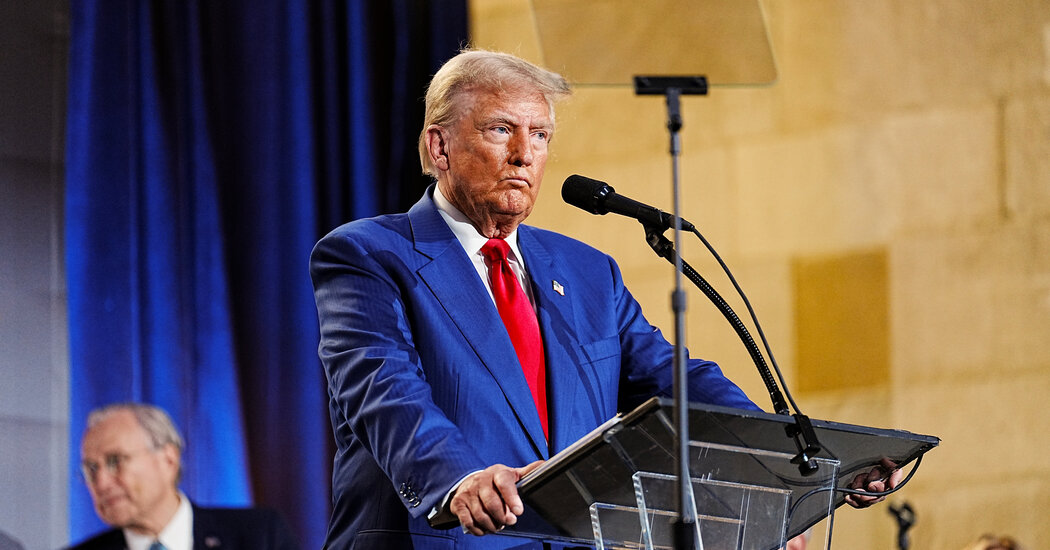

The last time the nation held a debate with the presidency on the line, a candidate with about eight decades of life behind him faced the challenge of proving that he was still up to the job of running the country. He failed.
Two and a half months later, the cast of characters has shifted and another candidate heading toward the octogenarian club confronts his own test to demonstrate that he has not diminished with age. Whether he passes that test may influence who will be the next occupant of the Oval Office.
At 78, former President Donald J. Trump exhibits more energy and speaks with more volume than President Biden does at 81, but he, too, has mixed up names, confused facts and stumbled over his points. Mr. Trump’s rambling speeches, sometimes incoherent statements and extreme outbursts have raised questions about his own cognitive health and, according to polls, stimulated doubts among a majority of voters.
With Mr. Biden now out of the race, the politics of age have been turned on their head. Mr. Trump is now the oldest person ever to run for president on a major party ticket and, if he wins, would become the oldest president in history by the end of his term, when he would be 82. While he managed to sidestep questions about his own capacity while Mr. Biden was his opponent, the rival he will square off against at Tuesday’s prime-time debate in Philadelphia will be Vice President Kamala Harris, who at 59 is nearly two decades younger.
The issue has been propelled back into the campaign by some of Mr. Trump’s recent public performances, most notably a meandering, hard-to-follow answer to a question on child care at the Economic Club of New York last week. Asked how he would help American working families stressed by the cost of taking care of children, Mr. Trump wandered through a thicket of unfinished sentences, non sequitur clauses and confusing logic that tied the answer to tariffs on imports.
A clip of the exchange went viral and prompted headlines with words like “incomprehensible,” “incoherence” and “gibberish.” The White House and Ms. Harris’s allies pounced, mocking the “word salad,” as multiple Democrats put it. “He couldn’t string together a coherent sentence,” Representative Katherine M. Clark of Massachusetts, the No. 2 House Democrat, wrote on social media.
As a result, analysts said, Mr. Trump will face renewed scrutiny at the debate. “Because the Harris campaign and press drew attention to the incoherence of Trump’s answer to the question about child care, he is now subject to the same ‘coherence’ test as was Biden,” said Kathleen Hall Jamieson, a scholar of presidential communication at the University of Pennsylvania’s Annenberg School for Communication.
Mr. Trump has long engaged in discursive, roundabout, off-script speaking that would not pass muster with an English teacher. Diagraming his sentences with a noun, verb and object can be daunting. He floats from one subject to another seemingly at random, often baffling listeners looking for a main point, a pattern that experts call tangentiality that increases with age. And he throws out wild assertions with no basis in fact.
He has mixed up Nikki Haley and Nancy Pelosi, declared more than once that he beat Barack Obama instead of Hillary Clinton and while arguing that he is mentally fit gave the wrong name for his former doctor. During a June rally in Nevada, he wandered into a bizarre rhetorical cul-de-sac speculating about being on a sinking boat and whether it would be better to be electrocuted in the water or attacked by a shark. “I’ll take electrocution every single time,” he volunteered. “I’m not getting near the shark. So we could end that. We’re going to end that for boats.”
Sometimes he makes false claims that are so far-fetched, they make him appear detached from reality. At the end of last month, he suggested that schools were sponsoring transgender transition surgery. “Your kid goes to school and comes home a few days later with an operation,” he said. “The school decides what’s going to happen with your child.”
He seems bent on self-destructive behavior that causes even allies to roll their eyes. Last Friday, without being asked, he raised allegations that he once molested a woman on an airplane in the 1970s. “I know you’re going to say it’s a terrible thing to say,” he said, “but it couldn’t have happened, it didn’t happen, and she would not have been the chosen one.”
Stephanie Grisham, who served as Mr. Trump’s White House press secretary but broke with him after the Jan. 6, 2021, attack on the Capitol and spoke at last month’s Democratic National Convention, said that Mr. Trump “can be disciplined when he wants to be” and that she expects him to get through Tuesday’s debate without looking diminished, given the rules and time limits.
“But I think his ramblings are certainly getting worse,” she added. “I don’t know if it’s his age or some kind of mental decline. I think the media, general public and certainly his supporters have grown desensitized to a man who lies and rambles all the time, and that’s unfortunate.”
Asked to comment on Monday, Steven Cheung, a spokesman for the campaign, focused on the former president’s physical strength. “The truth is that President Trump has more energy and more stamina than anyone in politics,” he said in an email. “People know President Trump is the strongest candidate. He has outworked and outpaced Kamala Harris who continues to duck the press. The Democrats and Kamala are the ones who are diminished because of all the hurt they have caused this country.”
Mr. Trump lately has come to explain his speaking style as “the weave,” suggesting that he is masterfully bringing together multiple seemingly unrelated topics into genius oratory. “I’ll talk about like nine different things, and they all come back brilliantly together,” he said last month.
Other than his rally-going fans, who mainly appear entertained and often understand the cryptic, unexplained shorthand references he makes, most voters have not been exposed to Mr. Trump’s stream-of-consciousness style at much length lately. But tens of millions will be watching on ABC on Tuesday, likely the largest audience before the election.
Mr. Trump’s challenge is different than Mr. Biden’s was. At the June 27 debate, which led to the end of his campaign, Mr. Biden appeared frail and pale, struggled to convey his message with lucidity or authority and even seemed to go blank. Mr. Trump, by contrast, appeared physically more vigorous and commanding, even though much of what he said proved false or unclear.
“It’s not a question of age, because Trump remains energetic,” said Ron Bonjean, a longtime congressional Republican strategist. “It’s a matter of focus and message discipline, because he has to convince the few remaining undecided voters that Harris is not only too liberal, but that he also has a real grasp on tackling problems that families are having today.”
Still, some Republicans think that age is a factor in a country where more than half the population is under age 40 as polls show increasing excitement for Ms. Harris among younger voters. Even aside from questions of capacity, Mr. Trump’s references are often rooted in decades-old touchstones, as in his repeated and mystifying allusions lately to the 1991 film “The Silence of the Lambs.”
“Many others have outlived their most productive years; Joe Biden and Donald Trump reached that inconvenient reality,” said Al Cardenas, a former Florida Republican Party chairman. “Biden made the right decision, perhaps helped to do so by his party’s leadership. It’s stunning to watch the lack of internal fortitude from the G.O.P.’s hierarchy to have the same conversation with their presidential candidate.”
Voters have long harbored concerns about Mr. Trump’s age, but more of them were worried about Mr. Biden’s, according to polls. Without the president to focus on, more Americans have expressed doubts about Mr. Trump’s capacity. Fifty-one percent of registered voters in a survey released last month by Morning Consult said that Mr. Trump is too old to run for president, up from 44 percent when he was running against Mr. Biden. Fifty-seven percent had that view in a poll by Marquette Law School.
Moreover, fewer voters now consider Mr. Trump mentally fit for the presidency. Just 48 percent in the Morning Consult poll said the former president was capable of handling the office, down from 53 percent. Nearly four in five said they were not sure he could serve another full four-year term, and roughly the same proportion were concerned about his ability to make decisions.
Mr. Trump’s response to the child care question in New York on Thursday underscored the concerns. Often his mangled statements are summarized in news accounts in ways that do not give the full picture of how baffling they can be. Quoting them at length, though, can provide additional context. Here is a more extended account of his reply on affordable child care:
“It’s a very important issue. But I think when you talk about the kind of numbers that I’m talking about that — because the child care is, child care, it’s, couldn’t, you know, there’s something, you have to have it. In this country, you have to have it. But when you talk about those numbers compared to the kind of numbers that I’m talking about, by taxing foreign nations at levels that they’re not used to, but they’ll get used to it very quickly — and it’s not going to stop them from doing business with us, but they’ll have a very substantial tax when they send product into our country. Those numbers are so much bigger than any numbers that we’re talking about, including child care, that it’s going to take care.”
What he seemed to be saying was that he would raise so much money by imposing tariffs on imported goods that the country could use the proceeds to pay for child care. In itself, that would be a disputable policy assumption.
But the failure to articulate the point, or any point, in a clear way left many in the room scratching their heads, including the questioner, and the response was eventually seen by millions on social media. It was, fair to say, an answer that did not age well.
The post As Debate Looms, Trump Is Now the One Facing Questions About Age and Capacity appeared first on New York Times.


